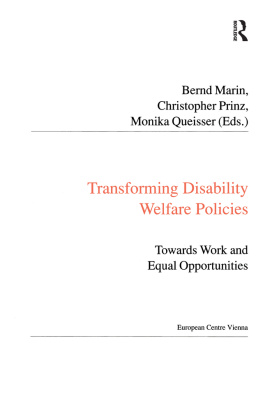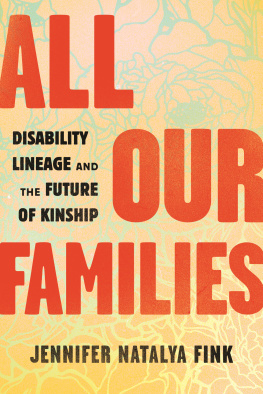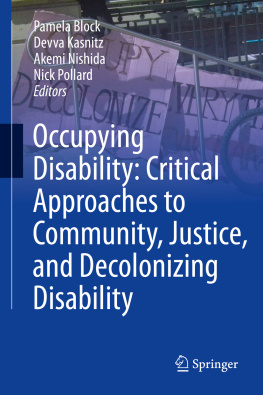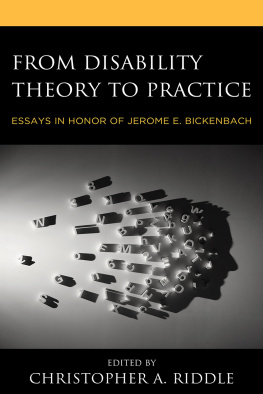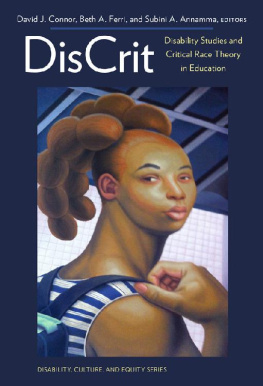Disability, Policy and
Professional Practice
This book is dedicated to our colleagues and friends in the UK Disabled Peoples Movement, to our colleagues at the Universities of Dundee and Northumbria University, to our co-Executive Editors at Disability and Society journal and in particular to Professor Len Barton, the Editor in Chief, who recently retired after a long and distinguished career in Disability Studies and Inclusive Education.
We wish to thank all our colleagues, friends and families for their patience whilst we wrote this book and for their encouragement.
Disability, Policy and
Professional Practice
Jennifer Harris & Alan Roulstone
Jennifer Harris and Alan Roulstone 2011
First published 2011
Apart from any fair dealing for the purposes of research or private study, or criticism or review, as permitted under the Copyright, Designs and Patents Act, 1988, this publication may be reproduced, stored or transmitted in any form, or by any means, only with the prior permission in writing of the publishers, or in the case of reprographic reproduction, in accordance with the terms of licences issued by the Copyright Licensing Agency. Enquiries concerning reproduction outside those terms should be sent to the publishers.
SAGE Publications Ltd
1 Olivers Yard
55 City Road
London EC1Y 1SP
SAGE Publications Inc.
2455 Teller Road
Thousand Oaks, California 91320
SAGE Publications India Pvt Ltd
B 1/I 1 Mohan Cooperative Industrial Area
Mathura Road
New Delhi 110 044
SAGE Publications Asia-Pacific Pte Ltd
33 Pekin Street #02-01
Far East Square
Singapore 048763
Library of Congress Control Number: 2010927595
British Library Cataloguing in Publication data
A catalogue record for this book is available from the British Library
ISBN 978-1-84920-169-8
ISBN 978-1-84920-170-4 (pbk)
Typeset by C&M Digitals (P) Ltd, Chennai, India
Printed by MPG Books Group, Bodmin, Cornwall
Printed on paper from sustainable resources
Introduction
There has never been a more interesting time to study the convergence of disability with social policy and professional practice. This book distils the many and various legislative and policy changes that have occurred over successive years since the inception of the welfare state to the present into a readable form for both practitioners and students working with disabled people.
Disability studies is an evolving discipline, largely borne from the discontent of members of the Disabled Peoples Movement, allied academics and professionals with traditional forms of health and social care services that have served to individualise disabled peoples issues and consequently produce isolating forms of service provision. This book seeks to demonstrate how disabled people and their allies have undertaken a journey from a time when they and their services were shaped by legislators and policy makers, to the present time when disabled people have turned the tables and are now participating in the shaping of disability policy.
With this new shaping possibility, has come the requirement to rethink modes of working with disabled people. Traditional service forms based on expert power wielded by cohorts of unenlightened professionals are no longer relevant in this new era. There is a pressing need instead for new forms of practice such as those described here, based on facilitation and advocacy and acknowledging the primacy and centrality of service users choice and control. Such practice should be personalised and outcome-focused. There is a unique defining moment here for professionals involved with disabled people to utilise their professional skills to support, facilitate and advocate for disabled people in a new form of positive practice described in this book.
Disabled people have in modern times had an increasingly fraught relationship with professionals from Health and Social Services the caring professions. We aim to show in this book that many if not all of these issues have been either directly or indirectly caused by adherence to the individual model of disability (Oliver, 1990), inappropriate and unwieldy bureaucratic structures and an obsession with expert power, at the expense of focusing on disabled peoples requirements. Although many disabled people and commentators have bemoaned this situation (Davis in Swain et al., 2004), little by way of solution has been suggested.
It is widely thought that professionals that act in these ways are unhelpful, that the lack of choice (Davis, in Swain et al., 2004) that is endemic in traditional service provision is lamentable and that basically everything takes too long owing to the creaking top-heavy structures in place, but very few acceptable suggestions and models of professional practice have been put forward by disabled people and their allies. Yet these pockets of non-stigmatising, helpful and assistive models and practice do exist, albeit in isolated and not well publicised formats (Harris et al., 2005; Silburn in Swain et al., 2004). It is an aim of this book to capitalise on these models and frameworks in order to demonstrate that assistance can be provided in ways that allow for choice and control to be retained and that are based on relationships of equality and respect. The term professional practice in our title therefore, does not reflect an endorsement of professional statuses, traditional service provision or expert power; in fact the opposite. Instead we seek to both problematise the concept and explore the tenets of (what we term as) positive practice ways of working with disabled people to achieve the desired outcomes of choice.
Importantly and centrally, this book is written by two allies of the British Disabled Peoples Movement who take their perspective from the social model of disability:
For many years doctors, social workers and other people have told disabled people that they are disabled because of what is wrong with them their legs dont work, they cant see or hear or they have difficulty learning things, just to give a few examples. This is known as the medical model of disability. It says that it is the persons individual problem that they are a disabled person.
What we say is that yes, we do have bits of us that dont work very well, this we call our impairment: for example a person who cannot hear very well has a hearing impairment. What we say is that it is not this impairment which makes us a disabled person, it is society which makes us disabled. Society does not let us join in properly information is not in accessible formats, there are steps into buildings, peoples attitudes towards us are negative. So society puts barriers before us which stop us from taking part in society properly it disables us. This is known as the social model of disability. (Greater Manchester Coalition of Disabled People, Young Disabled Peoples Group, 1996; quoted in Morris, 1999: 5)








